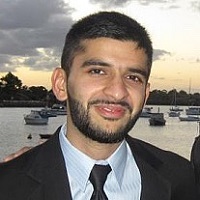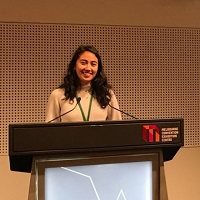June 19, 2018 Print
Four students from our Centre for Transplant and Renal Research were awarded Early Career Research awards at the recent Transplantation Society of Australia and New Zealand conference in Melbourne.
The award recognises individuals who have demonstrated commitment and achievement in research during the early stages of their academic career.
Here’s what these standout students have been researching.
 Ahmer Hameed received the award for his work on using normothermic kidney perfusion – a type of preservation technique – to better preserve kidneys and increase the numbers of kidneys available to potential transplant recipients.
Ahmer Hameed received the award for his work on using normothermic kidney perfusion – a type of preservation technique – to better preserve kidneys and increase the numbers of kidneys available to potential transplant recipients.
Ahmer said he was pleased to receive recognition for his work.
“It isan honour to receive the award, as it provides ongoing encouragement for the work I am doing with the rest of my team,” he said.
 Maryam El-Rashid presented research from her Honours year at the Institute. She investigated the role a membrane protein, CD47, plays in autophagy, the process where cells are broken down to enable new cell growth.
Maryam El-Rashid presented research from her Honours year at the Institute. She investigated the role a membrane protein, CD47, plays in autophagy, the process where cells are broken down to enable new cell growth.
Maryam explored the role of CD47 in patients with acute kidney injury (AKI) caused by a sudden loss of blood, finding the protein inhibited autophagy, which worsened kidney damage. If the protein is blocked, this could potentially protect the kidneys against damage.
Maryam thanked her supervisor, Dr Natasha Rogers, for the opportunity to work on the project.
“I feel honoured to be presented this award by TSANZ and I am extremely grateful for all the support my supervisor Natasha Rogers and CTRR have given me during my time at WIMR,” she said.
 Madhu Prakash’s research involves understanding the incidence of AKI among kidney transplant recipients. Transplant recipients have an increased risk of AKI due to factors such as immunosuppression. The findings of the study could help the early identification of risk factors for AKI, and possible treatment approaches.
Madhu Prakash’s research involves understanding the incidence of AKI among kidney transplant recipients. Transplant recipients have an increased risk of AKI due to factors such as immunosuppression. The findings of the study could help the early identification of risk factors for AKI, and possible treatment approaches.
Madhu said she was pleased that she and her fellow researchers received recognition for their efforts.
“I’m delighted at the recognition we have received for our project and hope that our final results will contribute significantly to the scientific community,” Madhu said.
“I am very grateful to Dr Natasha Rogers and the team at Westmead Institute for Medical Research for providing me with the opportunity to work on this project.”
 Yuanfei Zhao is investigating the use of xenotransplantation – the transplantation of organs, tissues and cells from animals to humans – as a way to manage donor organ shortages. She is using immune cells called memory T regulatory cells or ‘memory Tregs’ as a way to potentially prevent the rejection of an islet transplant from pigs to mice. If successful, the research could progress to large animal studies.
Yuanfei Zhao is investigating the use of xenotransplantation – the transplantation of organs, tissues and cells from animals to humans – as a way to manage donor organ shortages. She is using immune cells called memory T regulatory cells or ‘memory Tregs’ as a way to potentially prevent the rejection of an islet transplant from pigs to mice. If successful, the research could progress to large animal studies.
Yuanfei echoed her peers and said she felt privileged to receive the award.
“It’s an honour to receive the award - it is a positive affirmation on my PhD study. I am particularly grateful for not only my supervisors’ time and immense knowledge, but people in our group who also contribute to it with their help.”
Congratulations to our students!
Ahmer Hameed is supervised by Professor Wayne Hawthorne and Dr Natasha Rogers; Maryam El-Rashid and Madhu Prakash are supervised by Dr Natasha Rogers; Yuanfei Zhao is supervised by Professor Philip O'Connell.